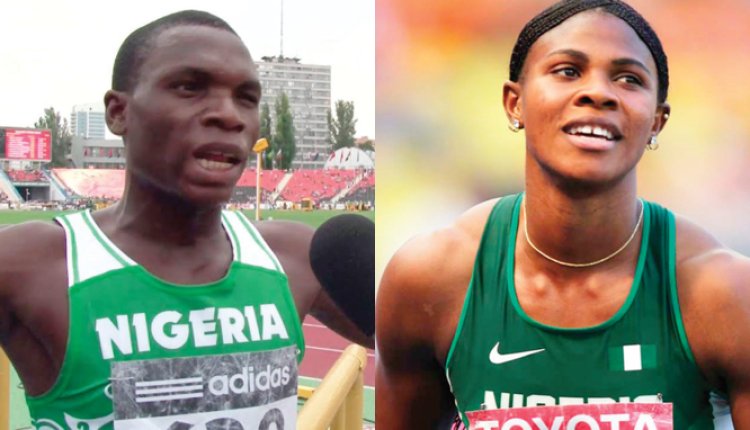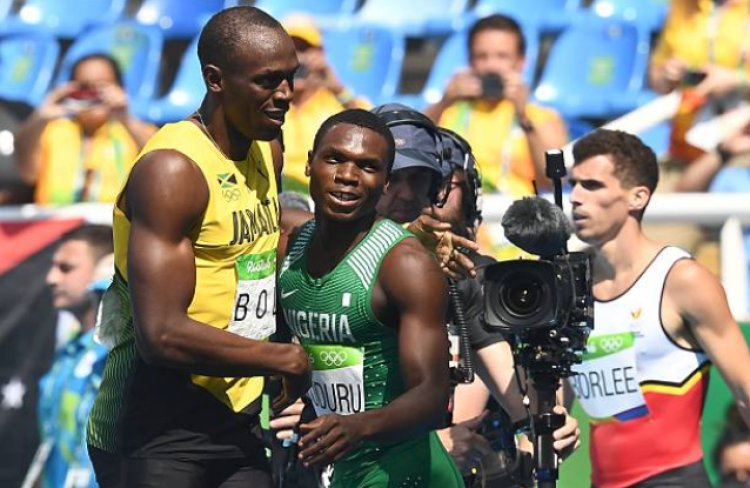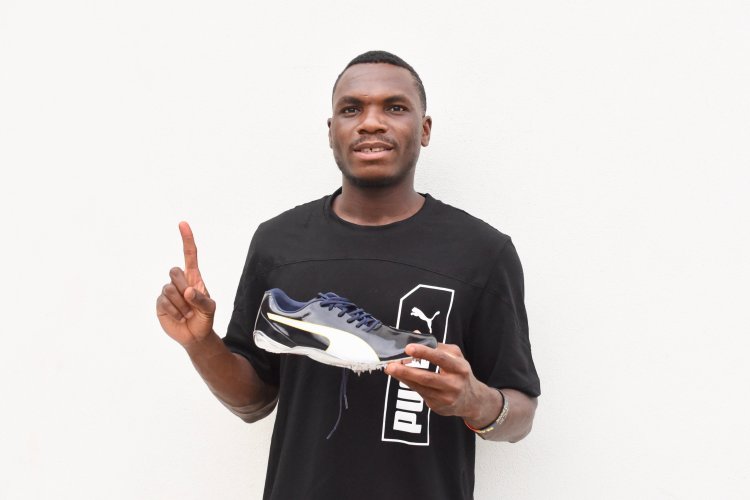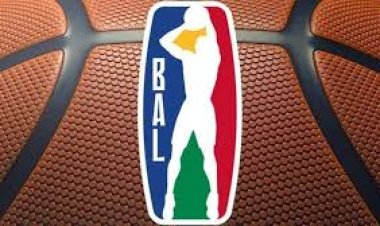Its official, that Athlete 2 in the Okagbare /Lira doping scandal is Oduduru

Three hundred and ninety-one days after The Times of London revealed details of the conversation between Blessing Okagbare and her drug supplier Eric Lira, the identity of Athlete 2, who could not be named then for legal reasons then is out. He is Divine Odururu. Olukayode Thomas writes that before AIU disclosure on Thursday, some members of the athletics family in Nigeria knew Oduduru was Athlete 2.
Introduction
For members of the Nigerian athletics family who have their ears close to the track, the suspect identified as Athlete 2 in the court papers filed against Eric Lira who is being prosecuted for supplying drugs to Blessing Okagbare could only be one person, Pastor.
Hardworking, easygoing, a prayer warrior, humble, all the positive adjectives in the world will not be enough to describe the meekness and gentility of Divine Oduduru popularly called Pastor by members of the athletics family because he will never walk away from you without sharing the word of God or saying, ‘God bless you’.
A sub-10.00-sec runner in the 100m and a sub-20.00 sec in the 200m, for which he holds the national record, Ejowvokoghene Divine Oduduru's character is something you rarely find among athletes.
Expect greats like Yussuf Alli, Innocent Egbunike, Falilat Ogunkoya and a few others, Nigeria athletes once they are on the verge of greatness are never humble and once, they become great, they are cocky and brash.
Probably following divine instruction, Divine acted his name then. Rubbing shoulders with greats like Usain Bolt since Rio 2016 did not change him.
Odururu gave the Jamaican great the scare of his life in 2016 in the preliminary rounds of the sprint events. Bolt after surviving the Oduduru scare predicted he will conquer the world one day but that may never happen.

Divine descent to earth
Divine, whose acts and deeds were angelic like that of a divine angel descent began a few years ago when members of the athletics family daily complained about his rudeness and arrogance and before anybody could say jack, there were rumours of his association with athletes that are associated with performance-enhancing drugs.
His world came crashing down in July 2021, when according to The Times Usada was contacted by a whistleblower who had found banned drugs in the Florida residence of an athlete known to Okagbare and referenced only as “Athlete-2” in the affidavit filed in the New York court.
The whistleblower took photographs of the packages, one of which was addressed to Okagbare, and passed the evidence to Usada, who shared the information with the FBI and the AIU.
Okagbare denies any wrongdoing. But by the time she returned to the US from Tokyo in disgrace, on August 2, 2021, the US authorities were waiting for her.
Officers from Customs and Border Protection “conducted a limited review of a mobile phone in the possession of Athlete-1” (Okagbare), and assisted by a special agent from the FBI “preserved copies of a series of WhatsApp messages, including a series of WhatsApp encrypted voice messages” between the Nigerian sprinter and Lira, dating back to November 2020.
WhatsApp messages between Okagbare and Lira and reference to Oduduru
In one message sent to Lira five days before the Nigeria trials for Tokyo Olympics in Lagos, Okagbare wrote: “So I took 2000 ui of the E [erythropoietin, EPO] yesterday, is it safe to take a test this morning?”
He replied: “Good day . . . 2000 ui is a low dosage.” To which she then replied with a message that demonstrates why whereabouts failures have to be taken seriously by anti-doping agencies. “Remember I took it Wednesday and then yesterday again. I wasn’t sure so I didn’t take a test. I just let them go so it will be a missed test,” she wrote.
In a voicemail that Okagbare left for Lira in June last year, she allegedly arranged for him to supply both her and a male athlete with growth hormone and EPO.
“Hey Eric, I just sent you $2,500, can you confirm it via Zelle?” she said. “And also, remember I told you [Athlete-2] had hurt his hamstring, so anything that will help the hamstring heal fast you can actually bring it as well, OK?”
The whistleblower found packages containing banned drugs in a Jacksonville residence that had been occupied by the male athlete. Described by the FBI as an associate of both athletes, the whistleblower had been asked by the male athlete to enter the property to pack up his belongings and transfer them to a storage facility.
It was then that the whistleblower discovered the banned drugs, contained in packages that also included Mexican drugs bearing Lira’s return address. The package seemingly sent to Okagbare was labelled with a separate address.

Okagbare, new African record and Oduduru
Oduduru never recovered early enough to test the efficacy of Lira’s drug but it almost helped Okagbare set a record but for the wind.
At the Nigeria trials for the Tokyo Olympic Games at Yaba Tech, Okagbare had run the 100m in 10.62sec to win the Nigerian Olympic trials; a time, back then, bettered only by Florence Griffith Joyner and one that had seemingly made her the fastest woman alive.
When Okagbare turned to see the clock, there was not a hint of concern that she might have attracted unwanted attention. The 32-year-old former Commonwealth champion burst into celebration, wriggling with joy on the ground before bouncing to her feet and running towards the main stand.
In the end, the time was rounded up to 10.63 and was not recorded as an African record because of a following wind of 2.7 metres per second. The limit is set at 2m/s. It did nothing, however, to dull Okagbare’s sense of excitement six weeks before the Olympic Games in Tokyo.
Four days later she messaged Eric Lira, the man now facing criminal charges in New York for allegedly supplying her with two banned performance-enhancing drugs.
“Hola amigo,” she said in messages detailed in a complaint filed in a Manhattan Federal Court this week. “Eric my body feel so good. I just ran 10.63 in the 100m on Friday. With a 2.7 wind. I am sooooo happy. Ericccccccc, whatever you did, is working so well.”
According to evidence uncovered by the FBI in a joint investigation with the United States Anti-Doping Agency (Usada) and the Athletics Integrity Unit (AIU), Okagbare had been supplied by Lira, a 41-year-old “naturopathic” therapist from El Paso, Texas, with human growth hormone and the blood-boosting drug EPO.
In October the AIU revealed that Okagbare had tested positive for EPO two days after that astonishing performance in Nigeria. She was not notified of that until August 20 and continued to prepare for Tokyo.
Okagbare is named “Athlete-1” in the court documents but the details — that she ran 10.63 on June 18 — make her easy to identify. By July 19, she was training in Slovakia. Lira sent her a message: “What you did . . . is going to help you for the upcoming events. You are doing your part and you will be ready to dominate.”
On the same day, she received a visit from drug testers. She would discover on July 30 that the blood sample they took had been found to contain growth hormone. By then she had already won her 100m heat at the Olympics. On July 31 the AIU announced that she would not be contesting the semi-final after failing a drug test. Using an encrypted messaging app, Okagbare messaged Lira in a panic from Japan. “Call me urgently,” Okagbare wrote. “They said one of my results came out positive on HGH . . . I don’t understand.”
In messages Okagbare, who in addition to the two failed tests has been charged by the AIU for refusing to co-operate with anti-doping investigators, refers to growth hormone as “honey”.
After the Games, the Athletics Integrity Unit (AIU) revealed that Okagbare had also tested positive for the blood-boosting drug EPO, charging her with the alleged use of two banned drugs as well as a refusal to cooperate with anti-doping investigators.

End of the road for Oduduru
Probably yes, probably no but if precedence is anything to go by, the chance that Odururu, who was tested about 11 times in Sapele last year, may be banned is high.
Okagbare, his partner, was suspended for a decade for the use of banned substances. Both athletes trained at Rena Reider’s Tumbleweed Track Club, which has boasted multiple Olympic and world champions.
Reider, 52, remains the subject of an investigation into allegations of sexual misconduct in the United States and was refused coaching accreditation for last year’s World Championships in Eugene, Oregon.
Oduduru is facing a long spell out of the sport after the AIU charged him with “possession and/or use or attempted use of multiple prohibited substances”. He has been provisionally suspended with immediate effect.
Okagbare, 34, was banned for ten years for the use of prohibited substances as well as a refusal to cooperate with the doping investigation. The Nigerian former Commonwealth sprint champion’s suspension has since been increased to 11 years.
A statement from the AIU read: “These alleged violations stem from an AIU investigation based on information in a criminal charge brought against US-based ‘naturopathic’ therapist Eric Lira, on January 12, 2022, by the United States Department of Justice under the Rodchenkov Act.
“Lira is alleged to have supplied performance-enhancing drugs to athletes before the Tokyo 2020 Olympic Games. The complaint against Lira provides specific information regarding persons identified as Athlete 1 and Athlete 2.”
Athlete 1, the AIU has confirmed, was Okagbare, adding: “Based on the information in the complaint, including text conversations imaged from Okagbare’s mobile phone by the FBI and further evidence obtained from the AIU investigation, the AIU alleges that Oduduru is Athlete 2 identified in the complaint.”




















